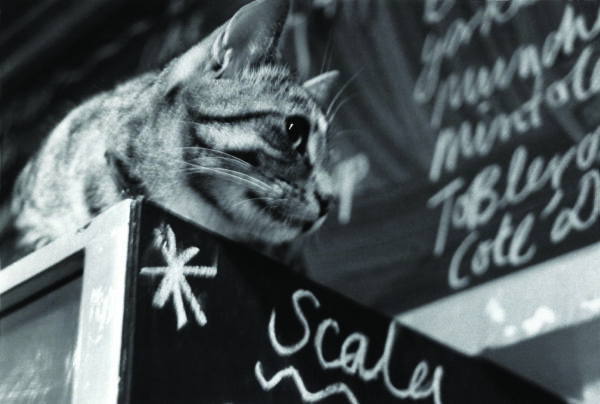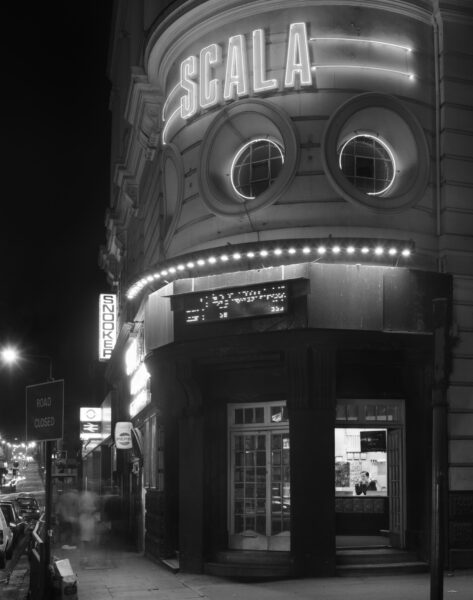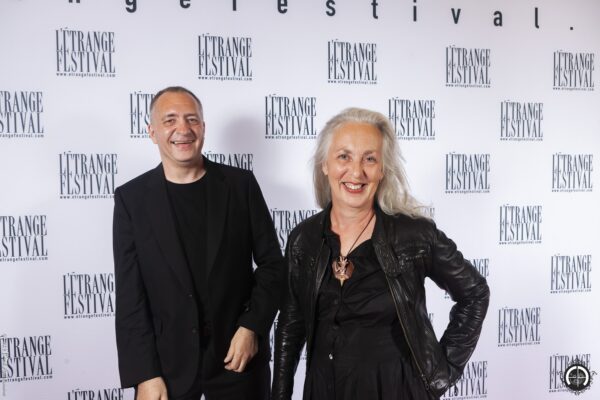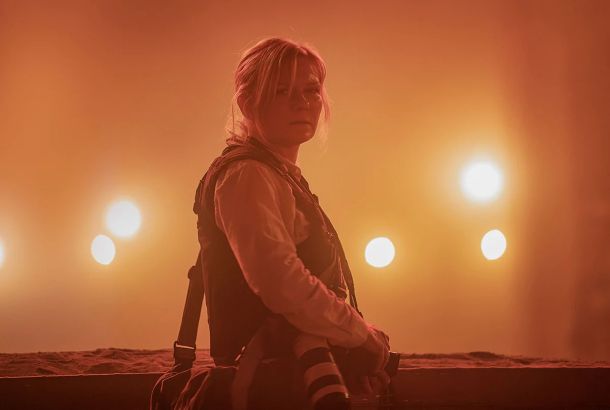SCALA!!! co-director Jane Giles on audiences, programming and being a first-time filmmaker: “There has to be room in the film world for all tastes”

As a bored and directionless 20-year-old, one of my many muses was the MUBI Podcast. I spent countless bus journeys to my mundane barista job, listening to the expansive ways Rico Gagliano would unfold the many brilliant “stories behind great cinema.” Despite it being a non-fiction podcast, the stories felt so fanciful to me as someone who would love to be “behind great cinema,” but was ultimately tethered to that bus journey.
One particular episode made a nest in my brain. It ventured into the history of a London cinema called Scala, a venue that “exhibited raucous, daring, and vivacious films,” and how it came to cultivate a certain type of audience member. The episode mainly tells its story through Jane Giles – a Scala attendee turned Scala programmer. I listened to it on loop. So much so that I began to associate sections of the bus route with moments in the episode.
It felt like that boring bus journey had reached its rightful destination, as a year on I sat opposite Giles on Zoom discussing her co-directed project with Ali Catterall. SCALA!!! short for the exquisitely long Scala!!! Or, the Incredibly Strange Rise and Fall of the World’s Wildest Cinema and How It Influenced a Mixed-up Generation of Weirdos and Misfits.
When I tell Giles how my infatuation with the Scala came to be as someone born a decade after its closure, she’s not surprised. “The people that loved SCALA!!! the most were people your age or even younger. Young women were coming up to us after saying ‘oh god I loved that, I had no idea what the Scala was. I had no knowledge of it, but I really enjoyed the idea of this kind of cinema. I really want to set up a film club or I want to work in archives, or I want to do this, I want to do that’.”
We live in a post-Scala world, and it’s been young women who are most attracted to the cinema’s outlandish nature. It seems this is not far from what female attendees at the time thought about the Scala.
“We have people like Viv Albertine who’s in The Slits and she was talking about how she would go to the Scala as a young woman, as would Mary Harron the filmmaker and they felt safe to be there. The cinema had cats. There were women working in the cinema. It wasn’t a woman only space, not all the time, sometimes it was a woman only space for the all-nighters. I think people […] they recognise themselves in the staff that were working there.”

In Sight and Sound, Sukhdev Sandhu compares Manchester’s Haçienda club to Scala and the contributions young women made to these communal spaces. “The key work at the Factory’s Haçienda nightclub was done by women, just as Jane Giles and Ali Catterall’s film highlights the young women responsible for programming at the Scala.”
It’s fitting that Giles co-directed SCALA!!! as no one else knows the crevices of the cinema quite like she does. “I was the fourth out of five programmers 1978 through to 1993, and I took over in ’88 ten years after the cinema had opened.”
“I think for me to programme the Scala when I was very young, I was only 23 or something when I started, it spoilt me for the rest of my working career. I honestly thought that it was always going to be that good. That I could walk into a job and find a flat nearby my perfect cinema which I love and had loved since I was 16. I could be completely free to programme whatever I wanted so long as the audience kept coming.”
As Giles states, before her years of programming she was just a regular punter. She recalls an exciting moment as a teenage girl going to the Scala for the first time with school friends attending an all-nighter screening. An unusual, grant of permission from her parents who were quite “conventional” as she describes. “I guess they thought you couldn’t get up to much harm in a cinema at an all-night show.”
“I remember seeing this place with its neon sign and at night I couldn’t see how dirty the building was on the outside, but I just fell in love with the building.”

“I was enchanted by the people there, all the leather jackets, a sort of art school crowd. That’s what it felt like, but there would also be ordinary people there too, boys with plastic bags from Forbidden Planet and all sorts of different types of people. That was really exciting when you come from a place that’s quite homogenous, very white, very lower middle class you know. It was just really thrilling to go to a place that was different.”
Even after the cinema’s closure, it remained alive in Giles’ mind. In 2018, she released Scala Cinema: London, 1978-1993, an archival book delving deeper into the cinema’s peculiar programming, edited by Ali Catterall. “When the book came out, several people had said to me ‘Is there going to be a documentary? This is a really good subject for a documentary?’”
Originally, SCALA!!! wasn’t intended to be made by Giles and Catterall. They offered the project to “a couple of established directors” but they were unavailable to make the film. It was the producers who pursued Giles to direct it as she had the “knowledge and enthusiasm” needed for the project. “I went ‘I’m nearly 60 years old, I don’t really want to make a documentary.’”
“But working my whole career in film exhibition and distribution, I realised the film wasn’t going to get made. So, I said I’d do it if Ali co-directed with me because you need to be able to talk things through and although he wasn’t an experienced filmmaker, he is experienced at being an editor and he really knows where the story is.”
Catterall is a journalist, he’s written for The Guardian, Time Out, The Big Issue amongst many other publications. Giles explains that “The art of [journalism] is understanding what the story is and keeping a finger on that detail, so that’s where Ali really came into his own.”

With the directors decided, the making of SCALA!!! commenced. Its budget came from a Kickstarter crowdfunding campaign and the BFI Doc Society. Giles describes how they “chipped away at the film bit by bit,” through lockdown. “We ended up with 50 hours of interview footage, which we transcribed and did a paper edit of the film based around the things that made us laugh, the things that made us cry, in sort of a rough three act narrative.”
Despite Giles and Catterall’s years of working in the film industry, the now director disclosed the difficulties of the job for them. “It was really strange to suddenly be on the other side of the fence, from a purely administrative role to dealing with a crew and with a cast who needed technical and other types of direction.” Even though the co-directors felt “inexperienced,” they were working with very experienced crew members like the cinematographer and the producers.
To mimic the energy of the cinema, they felt a youthful energy was needed behind the screen creating an intergenerational crew. “It was important for us to work with younger people on set because they brought an energy and a curiosity to the work. We didn’t just want to rely on very much older people who were there at the time. It does have that element of nostalgia but also a sort of openness to the film that makes young people want to see it.”
In terms of the film’s look, the duo used the Scala’s popular programme posters as inspiration for its “visual identity.” “We experimented in different ways like creating an advent calendar or window type effect of zooming into the programme to hint at the diversity of the films that were shown.”
“A certain type of film hit the Scala sweet spot. European art house, film noir, melodramas, or westerns. Whatever the genre was, there was a certain type of Scala film that rose in people’s imaginations out of the programme. Everything had equal importance. The prices were the same whether it was high or low art.”
This radical approach to curation clearly had an effect on the cinema’s attendees. “The Scala continues to be an education for people in all sorts of ways, I mean that’s how people felt about it at the time. People were saying it was an alternative film education, it had provided a sort of timetable or curriculum of different films that you would go and see. It chimed with curious minds.”
The experience of making a feature film was enlightening for Giles after spending her career on the other side of the film fence. She endorses that “anybody working in the film industry should be forced to make a film before they review or distribute one because you have an appreciation of what filmmakers go through in terms of how difficult and emotional the experience can be.”
Giles speaks for Catterall, who found it an “eye-opening experience” as someone who’s “written about films his whole life, he found it quite hard that some people didn’t unconditionally love the film”. But for a film about cinema audiences, it’s fair game. Giles says that “not everyone can like chocolate cake, not everyone can like champagne. People have different tastes. There has to be room in the film world for all tastes.”
“I think part of the thing that Scala was doing was providing a space and creating a community for people who felt like their tastes were on the outside because they found themselves drawn to quite extreme content.”
SCALA!!! is about the “audience experience of cinema”. It’s inherently charming, highlighting the youthful energy of niche film fans carving a community. As Giles puts it, their film “was trying to capture the feeling with a sort of theory of how [the Scala] really meant something to young people or people who were young at the time, and what they went on to do later in their lives.”
In a final nod to Scala’s devoted audience, the film lists well-known artists and filmmakers who frequented the cinema. Names such as Joanna Hogg, Steve McQueen, Gurinder Chadha and Christopher Nolan all gather on screen. It fascinates me then who amongst the audience of this documentary are the Hoggs and Nolans in the making. I also wonder, as a young person – the same confused 20-year-old on that bus journey –where my love of films will take me and what part the Scala will continue to play in that picture.
SCALA!!! is available to stream on BFI Player.







